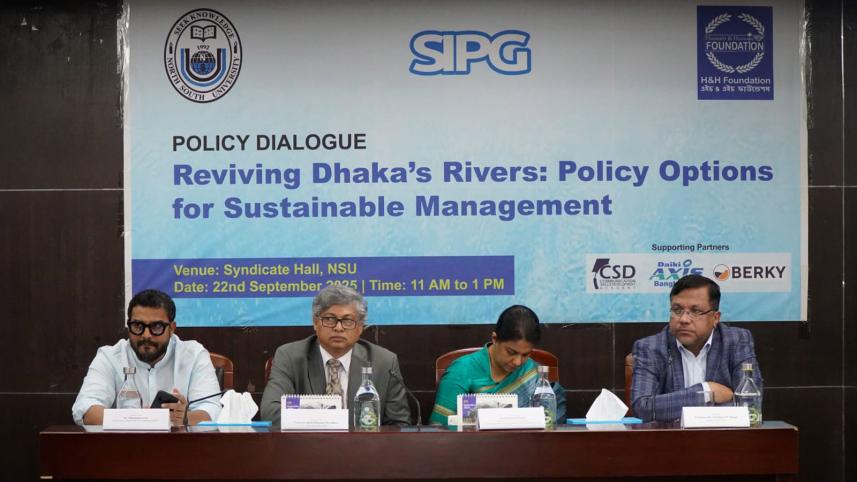NSU’s SIPG hosts policy dialogue on reviving Dhaka’s rivers

The South Asian Institute of Policy and Governance (SIPG) at North South University (NSU), in collaboration with the H&H Foundation, convened a high-level policy dialogue on "Reviving Dhaka's Rivers: Policy Options for Sustainable Management" at the university's Syndicate Hall.
The event was supported by BIWTA, Dhaka North City Corporation, Berky, Daiki Exis, and CSD Academy.
Encircled by the Buriganga, Turag, Shitalakkhya, Dhaleshwari, and Balu rivers, Dhaka faces severe pollution from industrial effluents, municipal waste, urban runoff, and encroachment. The dialogue brought together policymakers, academics, industry experts, and civil society leaders to chart actionable strategies for restoration.
Syeda Rizwana Hasan, advisor to the Ministry of Environment, Forest and Climate Change and the Ministry of Water Resources, underlined the lack of nature-centric priorities in urban development. She cautioned against quick fixes and called for a holistic approach, citing ecological damage from infrastructure projects and pointing to the Ganges restoration as a model.
Mohammad Azaz, administrator of Dhaka North City Corporation, pointed to successful efforts to revive two dead rivers and urged a biodiversity-focused, water-source approach to building a sustainable city.
Delivering the keynote, Abdus Samad, associate professor at Jagannath University and adjunct faculty at NSU, presented findings on heavy metal contamination in Dhaka's rivers, particularly the Buriganga and Shitalakkhya. He recommended the establishment of a River Protection Authority and economic incentives to promote cleaner industrial practices.
Other speakers included Md. Jakariya, director of the Climate Change and Disaster Resilience Center at NSU, who highlighted the long-term consequences of pollution and the need for integrated policy and community engagement. Public health specialist Anupam Hossain stressed cross-disciplinary collaboration, while Mohammed Julfiker Ali of the H&H Foundation noted enforcement gaps despite widespread awareness of pollution sources.
Commodore Arif Ahmed Mostafa, chairman of BIWTA, called for targeted interventions to address river system impediments and solid waste control. Rui Owase, managing director of Daiki Axis Bangladesh Ltd., emphasised tackling untreated sewage with smart, automated solutions, while Martin Alkemeier, managing director of Berky Asia Pte. Ltd., urged continuous action rather than waiting for perfection.
Chairing the session, NSU vice chancellor Abdul Hannan Chowdhury said waste management discussions must be matched by action at the pollution source. He pointed to SIPG's policy brief as a roadmap for sustainable solutions. The session opened with remarks by M. Shafaq Hussain, president and executive director of the H&H Foundation, and was moderated by Sk Tawfique M. Haque, director of SIPG.
The dialogue ended with a call for coordinated efforts among policymakers, industries, researchers, and citizens to restore Dhaka's rivers, protect livelihoods, and ensure a resilient urban ecosystem.



 For all latest news, follow The Daily Star's Google News channel.
For all latest news, follow The Daily Star's Google News channel.
Comments